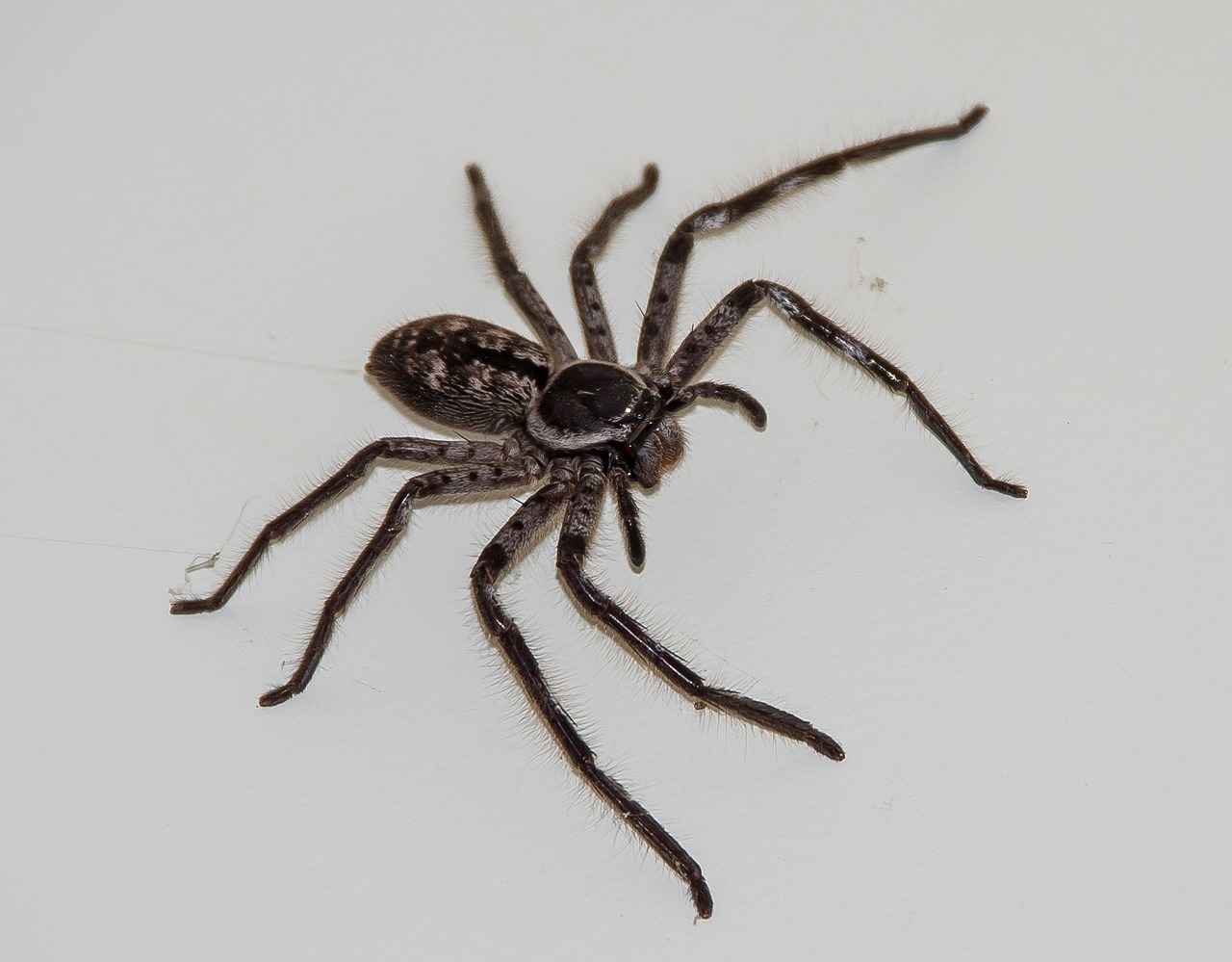Spiders can be an unwelcome surprise when you open your car door, especially if you’re not a fan of these eight-legged creatures. In this article, we will explore effective methods to eliminate spiders from your vehicle, providing practical tips and insights to ensure a spider-free driving experience.
Understanding the reasons behind spider infestations in vehicles can help you prevent future occurrences. Spiders are often attracted to cars due to:
- Dark Spaces: Spiders seek out dark, secluded areas to spin their webs.
- Food Sources: If your car has insects, it becomes a buffet for spiders.
- Parking Locations: Parking near vegetation or spider nests increases the likelihood of them hitching a ride.
There are various do-it-yourself methods to remove spiders from your car. Here are some effective strategies:
- Vacuuming: Regularly vacuuming your car can remove spiders and their eggs.
- Natural Repellents: Using natural ingredients can deter spiders without harmful chemicals.
Essential oils can serve as natural spider repellents. Discover the most effective oils:
- Peppermint Oil: Spiders dislike the strong scent.
- Tea Tree Oil: Known for its insect-repelling properties.
- Citrus Oil: The smell of citrus is a natural deterrent.
To ensure maximum effectiveness without damaging your car’s interior, follow these steps:
- Mix with Water: Combine a few drops of essential oil with water in a spray bottle.
- Spray Areas: Lightly spray areas where spiders are likely to hide, such as under seats and in the trunk.
- Use Cotton Balls: Soak cotton balls in essential oil and place them in corners of the car.
A clean car is less appealing to spiders. Here are some cleaning techniques:
- Regular Vacuuming: Remove debris and food particles that attract insects.
- Wipe Surfaces: Use a damp cloth to clean surfaces and remove any spider webs.
- Check for Cracks: Inspect your car for any entry points and seal them.
Implementing preventive measures can significantly reduce the chances of spiders making your car their home:
- Regular Maintenance: Establish a cleaning schedule to keep your car tidy.
- Parking Strategies: Avoid parking near bushes or tall grass where spiders may reside.
In some cases, a spider infestation may require professional help. Recognizing the signs of a significant spider infestation can help you decide when to call in professionals:
- Visible Webs: If you notice multiple webs in your car.
- Frequent Sightings: Regularly spotting spiders indicates a larger problem.
Selecting the right pest control service is crucial for effective spider removal. Look for:
- Experience: Choose a service with a proven track record in spider removal.
- Reviews: Check online reviews to gauge customer satisfaction.
By following these tips and strategies, you can effectively manage and eliminate spiders from your vehicle, ensuring a more enjoyable driving experience.

Why Are There Spiders in My Car?
When you find spiders in your car, it can be both unsettling and puzzling. Understanding the reasons behind these infestations is crucial for preventing future occurrences and effectively addressing the issue. Spiders are often attracted to vehicles for a variety of reasons, and recognizing these factors can help you maintain a spider-free environment.
- Food Sources: Spiders are predators and often follow their prey. If your car has crumbs, insects, or other food remnants, it may attract spiders seeking a meal.
- Hiding Spots: Vehicles provide numerous hiding places, such as under seats, in the glove compartment, and within the engine bay. These areas offer spiders a safe environment away from predators.
- Parking Locations: If you frequently park near vegetation or areas with high insect populations, your car may become a gateway for spiders. They often enter vehicles from nearby plants or shrubs.
- Seasonal Changes: During certain seasons, particularly spring and fall, spiders are more active and may seek shelter in cars as temperatures fluctuate.
To keep spiders at bay, it’s essential to implement preventive measures. Here are some effective strategies:
- Regular Cleaning: Maintain a clean car interior by vacuuming regularly to remove crumbs and debris. Pay special attention to hidden areas where spiders may hide.
- Seal Entry Points: Inspect your vehicle for any gaps or openings where spiders could enter. Sealing these points can significantly reduce the chances of an infestation.
- Avoid Parking Near Vegetation: Whenever possible, park your car away from bushes, trees, or tall grass, which can harbor spiders and other insects.
Being aware of the signs of a spider infestation can help you address the issue before it escalates. Look for:
- Webs: The presence of webs in and around your vehicle is a clear indication of spiders making themselves at home.
- Egg Sacs: Finding egg sacs is a sign that spiders have settled in and are likely to multiply.
- Visible Spiders: Seeing spiders, especially in numbers, is a strong indication that you need to take action.
If you discover spiders in your vehicle, don’t panic. Here are some steps to take:
- Remove Spiders Safely: Use a vacuum or a jar to capture and release spiders outside, ensuring they don’t return.
- Clean Thoroughly: After removing the spiders, clean your car to eliminate any potential food sources and hiding spots.
- Consider Natural Repellents: Essential oils, such as peppermint or tea tree oil, can deter spiders. Mix with water in a spray bottle and apply it to areas where spiders may enter.
By understanding the reasons behind spider infestations and taking proactive measures, you can keep your vehicle free of these unwanted guests. Regular maintenance and awareness of your surroundings will contribute to a more enjoyable driving experience.

Effective DIY Spider Removal Techniques
When it comes to keeping your vehicle free from unwanted guests, spiders can be particularly bothersome. Understanding effective DIY spider removal techniques is essential for maintaining a clean and comfortable driving environment. Below are various methods that are both natural and effective, ensuring you can tackle spider issues without harmful chemicals.
Many people prefer DIY methods for several reasons. These approaches are typically cost-effective, environmentally friendly, and can be tailored to suit individual preferences. Furthermore, using natural repellents reduces the risk of exposing pets and children to harmful substances.
One of the most effective ways to deter spiders is through the use of natural repellents. Here are some popular options:
- Vinegar: A mixture of equal parts vinegar and water can be sprayed in corners and crevices of your car.
- Essential Oils: Oils such as peppermint, tea tree, and lavender not only smell great but can also effectively keep spiders away.
- Citrus Peels: Spiders dislike the scent of citrus. Placing orange or lemon peels in your car can help repel them.
A clean car is less inviting to spiders. Implementing regular cleaning routines can significantly reduce spider presence. Here are some effective strategies:
- Vacuuming: Regularly vacuum your car’s interior, especially under the seats and in hard-to-reach areas where spiders might hide.
- Wiping Surfaces: Use a damp cloth to wipe down surfaces, removing any spider webs or eggs that may have been laid.
- Decluttering: Remove any unnecessary items from your car that could provide hiding spots for spiders.
Essential oils can be a powerful tool in your spider removal arsenal. Here’s how to use them:
- Diffusion: Use an essential oil diffuser in your car to disperse the scent throughout the space.
- Spray Solution: Mix a few drops of essential oil with water in a spray bottle and apply it to areas where spiders are likely to enter.
- Soaked Cotton Balls: Soak cotton balls in essential oils and place them in various spots within your car.
Taking proactive steps can help prevent spiders from returning. Here are some tips:
- Parking Location: Avoid parking near dense vegetation or areas with known spider activity.
- Regular Inspections: Periodically check your car for signs of spider activity, especially after being parked for extended periods.
- Seal Entry Points: Inspect your car for any gaps or openings that could allow spiders to enter and seal them if necessary.
By employing these DIY spider removal techniques, you can create a more pleasant driving experience. Regular maintenance and the use of natural repellents will not only help keep your vehicle spider-free but also contribute to a healthier environment for you and your passengers.
Using Essential Oils as Spider Repellents
When it comes to keeping spiders out of your car, essential oils can be a remarkably effective and natural solution. These oils, derived from various plants, not only emit pleasant fragrances but also possess properties that can deter spiders and other pests. In this section, we will explore how to effectively use essential oils as spider repellents and which specific oils are most beneficial.
Many people prefer using essential oils because they are non-toxic and environmentally friendly compared to chemical pesticides. Additionally, essential oils can be easily sourced and applied, making them a convenient option for car owners looking to maintain a spider-free environment. The strong scents of these oils can mask the natural pheromones that attract spiders, thus helping to keep them at bay.
- Peppermint Oil: Known for its refreshing scent, peppermint oil is one of the most effective oils for repelling spiders. Its strong aroma disrupts their sensory perception.
- Lavender Oil: Not only does lavender smell wonderful, but it also has calming properties that spiders find unappealing.
- Eucalyptus Oil: The sharp scent of eucalyptus oil is another effective deterrent. It can be particularly useful in larger spaces.
- Tea Tree Oil: This oil has potent antimicrobial properties and a strong scent that spiders dislike.
- Citronella Oil: Often used to repel mosquitoes, citronella is also effective against spiders, making it a versatile choice for outdoor and indoor use.
To maximize the effectiveness of essential oils in keeping your car spider-free, consider the following application methods:
- Essential Oil Spray: Mix 10-15 drops of your chosen essential oil with water in a spray bottle. Shake well and spray around the interior of your car, focusing on corners and hidden spaces.
- Soaked Cotton Balls: Soak cotton balls in essential oils and place them in areas where spiders are likely to enter, such as under the seats or in the trunk.
- Diffusers: Use a car diffuser designed for essential oils to continuously emit the fragrance while you drive. This method not only helps repel spiders but also keeps your car smelling fresh.
While essential oils are generally safe, it is crucial to use them with caution. Always dilute oils before applying them to surfaces to prevent damage. Additionally, ensure that you are not allergic to any oils you choose to use. It’s advisable to test a small area first before applying them extensively in your vehicle.
For enhanced effectiveness, consider combining essential oils with other spider control methods. Regular cleaning and vacuuming of your car can help eliminate spider webs and eggs, creating an uninviting environment for these pests. Furthermore, sealing any cracks or openings in your vehicle can prevent spiders from entering in the first place.
By incorporating essential oils into your spider control routine, you can effectively maintain a spider-free vehicle while enjoying the added benefits of natural fragrances. With a little effort and the right oils, you can ensure that your car remains a comfortable and inviting space, free from unwanted eight-legged visitors.
Best Essential Oils for Repelling Spiders
When it comes to keeping spiders at bay, essential oils are a fantastic natural solution. Not only do they smell great, but they can also effectively repel these eight-legged pests. Let’s explore some of the and how to use them effectively in your home or car.
Essential oils are derived from plants and contain potent compounds that are often unpleasant to spiders. Unlike chemical repellents, these oils are non-toxic and safe for use around pets and children. This makes them an ideal choice for those looking to maintain a natural pest control method.
- Peppermint Oil: Known for its strong scent, peppermint oil is highly effective in repelling spiders. The aroma is overwhelming for them, making it a popular choice among homeowners.
- Tea Tree Oil: This oil not only smells fresh but also has natural insect-repelling properties. Its effectiveness against spiders makes it a must-have in your pest control arsenal.
- Lavender Oil: While humans may find lavender soothing, spiders are repelled by its scent. Use lavender oil to create a calming atmosphere while keeping spiders away.
- Citrus Oil: Oils derived from citrus fruits, such as lemon and orange, are also effective. The strong smell of citrus is often unappealing to spiders.
- Eucalyptus Oil: This oil has a refreshing scent that spiders dislike. Eucalyptus is not only a repellent but also helps to purify the air in your space.
To maximize the effectiveness of essential oils in repelling spiders, follow these simple methods:
- Diffusion: Use a diffuser to spread the scent of essential oils throughout your home or car. This method ensures that the aroma reaches all corners, creating an unwelcoming environment for spiders.
- Spray Solution: Mix 10-15 drops of your chosen essential oil with water in a spray bottle. Shake well and spray around windows, doors, and other entry points to deter spiders.
- Soaked Cotton Balls: Soak cotton balls in essential oils and place them in areas where you’ve spotted spiders. This will create localized areas of repellent scent.
- Cleaning Solutions: Add a few drops of essential oils to your regular cleaning solutions. This not only cleans but also leaves a protective barrier against spiders.
While essential oils are generally safe, it’s important to take some precautions:
- Always test a small area first to ensure that the oil does not damage surfaces.
- Keep oils out of reach of pets and children, as some essential oils can be harmful if ingested.
- Consult with a healthcare professional if you have allergies or sensitivities to certain oils.
By incorporating these essential oils into your pest control routine, you can effectively keep spiders at bay while enjoying pleasant aromas in your home or car. Choose your favorite oils, follow the application methods, and create a spider-free environment naturally.
How to Apply Essential Oils in Your Car
When it comes to maintaining a fresh and pleasant atmosphere in your vehicle, essential oils can be a game changer. Not only do they provide delightful fragrances, but they also have properties that can help repel unwanted pests, such as spiders. However, it’s crucial to apply them correctly to ensure both maximum effectiveness and the safety of your car’s interior.
Essential oils are derived from plants and are known for their aromatic and therapeutic qualities. Using them in your car can help create a calming environment, reduce stress during commutes, and even act as a natural insect repellent. But how do you apply them without risking damage to your vehicle?
- Choose the Right Oils: Not all essential oils are created equal. Some of the most effective oils for repelling spiders include peppermint, tea tree, and lavender.
- Use a Diffuser: Investing in a car diffuser is one of the safest methods to disperse essential oils. It allows for even distribution of the aroma without direct contact with surfaces.
- Mix with a Carrier Oil: If you prefer to apply oils directly, always dilute them with a carrier oil like coconut or jojoba oil to prevent damage to your car’s interior.
- Fabric Refreshers: Create a fabric refresher spray by mixing essential oils with water and a small amount of vinegar. This can be sprayed lightly on upholstery and carpets.
Creating a simple car spray can be both fun and effective. Here’s a quick recipe:
Ingredients:- 1 cup of distilled water- 10-15 drops of your chosen essential oil- 1 tablespoon of vodka or rubbing alcohol (optional, helps with mixing)Instructions:1. Combine all ingredients in a spray bottle.2. Shake well before each use.3. Lightly mist the interior of your car, avoiding direct contact with leather or plastic surfaces.
While essential oils are natural, they can still cause reactions if not used properly. Follow these safety tips:
- Test for Allergies: Before extensive use, test a small area of your car’s interior to ensure there’s no adverse reaction.
- Avoid Direct Sunlight: Some oils can degrade materials when exposed to direct sunlight, so avoid applying them in areas that receive constant sunlight.
- Keep Out of Reach: If you have children or pets, ensure that essential oils are stored safely and not accessible to them.
Applying essential oils in your car can enhance your driving experience while keeping unwanted pests at bay. By following the right methods and safety precautions, you can enjoy a fresh-smelling vehicle without compromising its interior. Experiment with different oils to find the perfect scent that suits your style and needs.
Cleaning Your Car to Deter Spiders
Keeping your car clean is not just about aesthetics; it plays a crucial role in deterring unwanted pests, particularly spiders. A cluttered or dirty vehicle provides an ideal environment for spiders to thrive, as they seek out dark, secluded spaces to build their webs. Therefore, understanding effective cleaning techniques can significantly reduce the likelihood of a spider infestation.
Spiders are attracted to areas where they can find food and shelter. A clean car minimizes these attractions. Regular cleaning removes not only spiders but also their potential food sources, such as insects. By maintaining a tidy environment in your vehicle, you can make it less appealing to these eight-legged intruders.
- Vacuuming: Regularly vacuum your car’s interior, focusing on hidden areas such as under the seats and in the trunk. This helps eliminate spiders and their eggs.
- Wiping Surfaces: Use a damp cloth to wipe down surfaces, including the dashboard and door panels. This not only removes dust but also any spider webs that may have formed.
- Cleaning Carpets and Mats: Remove and wash floor mats regularly. Spiders can hide in the fibers, so keeping them clean is essential.
When cleaning your car, consider using natural cleaners that can also repel spiders. For instance, a mixture of water and vinegar can be effective. The strong scent of vinegar is known to deter many pests, including spiders. Additionally, using essential oils like peppermint or tea tree oil in your cleaning solution can provide extra protection. These oils are not only effective spider repellents but also leave your car smelling fresh.
One of the most effective ways to deter spiders is to declutter your car. Remove any unnecessary items that can provide hiding spots for spiders. This includes:
- Old papers and receipts
- Food wrappers and containers
- Clothing and bags
By keeping your car organized, you reduce the chances of spiders finding a suitable environment to settle in.
Establishing a routine cleaning schedule is vital in preventing spider infestations. Aim to clean your car at least once a month, or more frequently if you often park near vegetation or in areas known for spider activity. Consistency is crucial; the more regularly you clean, the less likely spiders will take up residence in your vehicle.
Where you park your car can also influence spider presence. Parking near bushes, trees, or other vegetation can increase the likelihood of spiders entering your vehicle. Whenever possible, choose parking spots that are away from these areas. Additionally, consider parking in well-lit areas, as spiders tend to prefer dark, secluded spots.
By implementing these cleaning techniques and preventive measures, you can significantly reduce the chances of spiders making your car their home. A clean, organized vehicle not only enhances your driving experience but also keeps unwanted pests at bay. Remember, consistency is key to maintaining a spider-free environment in your car.

Preventive Measures to Keep Spiders Away
When it comes to keeping your car free from spiders, preventive measures play a crucial role. By taking proactive steps, you can significantly decrease the likelihood of these eight-legged creatures making your vehicle their home. Below are effective strategies to help you maintain a spider-free environment in your car.
Understanding the importance of preventive measures is vital. Spiders are often attracted to dark, undisturbed spaces, making your car an ideal location. By implementing specific strategies, you can deter spiders from settling in.
One of the most effective ways to keep spiders away is to maintain a regular cleaning routine. Here are some practical tips:
- Vacuum Frequently: Regularly vacuum the interior of your car, focusing on hidden areas such as under the seats and in the trunk.
- Remove Food Debris: Ensure that any food particles or wrappers are promptly discarded, as they can attract not only spiders but also other pests.
- Wipe Surfaces: Use a damp cloth to wipe down surfaces, removing any spider webs or eggs that may have been laid.
Where you park your car can influence the likelihood of spider infestations. Here are some tips:
- Avoid Parking Near Vegetation: Spiders often inhabit plants and bushes. Parking away from these areas can reduce the chance of spiders entering your vehicle.
- Choose Well-Lit Areas: Spiders prefer dark, secluded spots. Parking in well-lit areas can deter them from approaching your car.
- Inspect Your Parking Spot: Before leaving your car, check for any spider activity in your immediate surroundings.
In addition to cleaning and parking strategies, using natural repellents can be an effective way to keep spiders at bay. Here are some options:
- Essential Oils: Oils such as peppermint, tea tree, and lavender are known to repel spiders. Mix a few drops with water in a spray bottle and apply it in your car.
- Citrus Peels: Spiders dislike citrus scents. Placing orange or lemon peels in your car can help deter them.
Regular inspections of your vehicle can help you catch any signs of spider activity early. Look for:
- Webs: Check corners and crevices for spider webs, which can indicate a spider presence.
- Eggs: Be on the lookout for small egg sacs, which can lead to a larger infestation if not addressed.
The exterior of your car can also attract spiders. Here’s how to keep it less inviting:
- Wash Your Car Regularly: A clean exterior is less appealing to spiders. Regular washes remove dirt and organic matter that can attract pests.
- Check for Cracks: Inspect your vehicle for any cracks or gaps where spiders could enter. Seal these areas to prevent access.
By following these preventive measures, you can significantly reduce the chances of spiders making your car their home. Implementing a combination of cleaning routines, parking strategies, and natural repellents will help ensure a spider-free driving experience.
Regular Maintenance and Cleaning Routines
Maintaining a clean vehicle interior is essential not just for aesthetics but also for keeping unwanted pests, such as spiders, at bay. A well-maintained car is less likely to attract these eight-legged intruders. Below are some effective practices to establish a regular cleaning schedule that can help you enjoy a spider-free driving experience.
Spiders are often drawn to areas that provide shelter and food sources. A cluttered car interior can create the perfect environment for them to thrive. By regularly cleaning your vehicle, you can eliminate potential hiding spots and food sources, making it less inviting for spiders.
- Vacuum Regularly: Use a vacuum cleaner to remove dust, debris, and any food remnants from your car. Pay special attention to hidden areas like under the seats and in the trunk.
- Wipe Down Surfaces: Use a damp cloth or disinfectant wipes to clean surfaces such as the dashboard, console, and door panels. This not only removes dirt but also helps eliminate spider webs and eggs.
- Declutter Your Car: Regularly remove unnecessary items from your vehicle. Items like clothing, bags, and trash can provide hiding places for spiders.
- Use Air Fresheners Wisely: While air fresheners can improve the smell of your car, some may contain ingredients that attract pests. Opt for natural options that deter spiders, such as citrus-scented products.
- Check for Cracks and Gaps: Inspect your car for any cracks or gaps where spiders could enter. Seal these openings to prevent them from making your vehicle their home.
To effectively keep spiders at bay, consider establishing a cleaning routine. Here’s a simple plan you can follow:
Weekly:- Vacuum the interior- Wipe down surfacesMonthly:- Deep clean the carpets and upholstery- Check for any signs of spider webs or nestsSeasonally:- Inspect the vehicle for cracks or gaps- Clean the exterior to remove any spider eggs or webs
In addition to regular cleaning, there are a few more strategies you can implement:
- Avoid Parking Near Vegetation: Spiders are often found in gardens and bushes. Try to park your car away from these areas to reduce the likelihood of them entering your vehicle.
- Use Natural Repellents: Consider using natural spider repellents, such as peppermint oil or vinegar, to deter spiders from entering your car.
By following these cleaning practices and preventive measures, you can significantly reduce the chances of spiders infesting your vehicle. Remember, a clean car not only enhances your driving experience but also protects you from unwanted pests.
Parking Strategies to Avoid Spider Infestations
When it comes to keeping spiders out of your car, where you park can significantly influence their presence. Understanding effective parking strategies is essential to minimize the risk of spiders entering your vehicle. Below are some practical tips that can help you avoid spider infestations.
The location where you park your car can attract or deter spiders. Areas with dense vegetation, tall grass, or nearby trees tend to harbor more spiders. These environments provide ideal habitats for spiders to thrive, making your car an easy target for their migration. By selecting your parking spot wisely, you can significantly reduce the likelihood of encountering these eight-legged pests.
- Avoid Parking Near Vegetation: When possible, steer clear of parking close to bushes, shrubs, or tall grass. These areas can serve as breeding grounds for spiders.
- Choose Well-Lit Areas: Spiders are less likely to inhabit brightly lit spaces. Look for parking spots that are well-lit, as these areas are less inviting for spiders.
- Park on Hard Surfaces: If you have the option, park on concrete or asphalt rather than grass or dirt. Hard surfaces are less conducive to spider habitation.
- Use Parking Garages: Enclosed parking garages offer a more controlled environment that is less appealing to spiders compared to outdoor parking.
Another factor to consider is the time of day you park your vehicle. Spiders are more active during certain times, especially during dusk and dawn. To minimize spider encounters, try to park your car during daylight hours when they are less active. Additionally, if you know you will be parked for an extended period, consider moving your vehicle periodically to disrupt any potential spider activity.
In addition to strategic parking, conducting regular inspections of your car can help you catch any spider activity before it becomes a problem. Make it a habit to check under the seats, in the trunk, and around the windows for any signs of spiders or their webs. Keeping your vehicle clean and clutter-free will also make it less appealing to spiders.
While parking strategies are crucial, you can also enhance your defenses by using natural spider repellents. Consider placing essential oil diffusers in your car, using scents like peppermint or lavender, which are known to repel spiders. Additionally, keeping your windows rolled up and doors closed when parked will further reduce the chances of spiders entering your vehicle.
By implementing these parking strategies and combining them with regular maintenance and cleaning, you can effectively minimize the risk of spider infestations in your car. Remember, a proactive approach is key to ensuring a spider-free driving experience.

When to Call a Professional Exterminator
When dealing with a spider infestation in your vehicle, it’s essential to recognize the right moment to seek professional help. While many spider encounters can be managed through DIY methods, there are situations where the expertise of a pest control expert is necessary for effective removal.
Not all spider appearances in your car warrant a call to a professional. However, if you notice a significant increase in spider sightings, especially in hard-to-reach areas like under the seats or in the trunk, it may indicate a more serious problem. Common signs that suggest you should consider professional intervention include:
- Frequent sightings: If you see multiple spiders consistently, it’s a sign of an established nest.
- Web formations: Large webs, particularly in corners or hidden spaces, suggest a thriving spider population.
- Presence of spider eggs: Finding egg sacs can indicate that a larger infestation is imminent.
While most spiders are harmless, some can pose health risks, especially if they are venomous. If you suspect the presence of black widows or brown recluses, it is crucial to contact a pest control professional immediately. These spiders can cause serious health issues, and their bites may require medical attention. Additionally, if anyone in your household has allergies or sensitivities, a spider infestation could exacerbate these conditions.
Before deciding to call an exterminator, evaluate your attempts at DIY spider removal. If your methods have not yielded results after several weeks, it may be time to bring in the experts. Common DIY methods include:
- Using essential oils as repellents.
- Regular cleaning and vacuuming.
- Sealing entry points to prevent access.
If these strategies have failed to reduce the spider population, professional extermination may be the most effective solution.
Once you’ve decided to seek professional help, it’s essential to choose the right pest control service. Look for companies that specialize in spider removal and have positive customer reviews. Ask about their methods and ensure they use safe and effective treatments. A reputable service will also provide a thorough inspection and offer preventative advice to keep spiders from returning.
The cost of hiring a pest control expert can vary significantly based on factors such as the extent of the infestation and the methods used. On average, you can expect to pay between $100 and $400 for spider extermination services. While this may seem like a considerable investment, it is often more cost-effective than dealing with the consequences of a severe infestation.
In conclusion, recognizing when to call a professional exterminator is key to effectively managing a spider infestation in your vehicle. By understanding the signs of a severe infestation, evaluating your DIY efforts, and choosing the right pest control service, you can ensure that your car remains a spider-free zone.
Signs You Need Professional Help
When it comes to dealing with spider infestations, recognizing the signs that indicate a significant problem is crucial. Many people may not realize that a few spiders here and there can quickly escalate into a larger issue. This article will guide you through the key indicators that suggest it’s time to call in professionals for effective spider removal.
One of the first signs of a potential infestation is the number of spiders you observe. If you notice several spiders in your car or home, especially in a short period, it may indicate that they are breeding nearby. A sudden increase in spider sightings should prompt you to investigate further.
Another clear sign of a spider problem is the presence of spider webs. These webs can often be found in corners, under furniture, or in less disturbed areas of your vehicle. If you see webs forming regularly, it’s a strong indication that spiders are making themselves at home.
Finding spider egg sacs can be alarming. These sacs can contain dozens or even hundreds of baby spiders. If you come across an egg sac, it’s a sure sign that you need to act quickly to prevent a larger infestation. It’s advisable to seek professional help to ensure complete removal.
If you or your family members are experiencing frequent spider bites or allergic reactions, it may indicate that spiders are nesting too close for comfort. While not all spiders are harmful, some can cause adverse reactions. In such cases, it’s best to consult a pest control expert.
Spiders tend to hide in dark, undisturbed areas. If you notice spiders in places like your garage, attic, or even in the trunk of your car, it may be a sign of a larger problem. Regularly checking these areas can help you catch infestations early.
Sometimes, spiders are a sign of other pest issues. If you notice an increase in insects, it can attract spiders looking for food. This can create a cycle of pest problems that may require professional intervention to resolve.
If you’ve tried various DIY methods to eliminate spiders and they persist, it’s time to call in the experts. Professional pest control services have access to more effective treatments and can provide long-term solutions that DIY methods cannot.
When it comes to selecting a pest control service, look for companies that have good reviews and a strong reputation. Ask for recommendations and ensure they use safe and effective methods for spider removal.
In summary, recognizing the signs of a significant spider infestation is essential for maintaining a safe and comfortable environment. By being vigilant and proactive, you can prevent small spider problems from escalating into major infestations.
Choosing the Right Pest Control Service
When dealing with a spider infestation, can make all the difference in achieving a spider-free environment. With numerous options available, it’s essential to know how to identify a reliable and effective exterminator in your area. Here are some key tips to help you select the best pest control service.
Finding a qualified pest control service is crucial for effective spider removal. A professional can not only eliminate existing spiders but also implement strategies to prevent future infestations. Without the right expertise, you may find yourself battling recurring spider problems.
- Check Online Reviews: Look for customer feedback on platforms like Google, Yelp, or Angie’s List to gauge the effectiveness of local services.
- Ask for Recommendations: Consult friends, family, or neighbors who have dealt with pest issues to get trustworthy referrals.
- Verify Credentials: Ensure the exterminator is licensed and insured, which protects you and your property during treatment.
Inquire about the techniques and products used by the pest control service. A reputable company should be transparent about their methods and offer eco-friendly options if you prefer a less toxic approach. Understanding their treatment plan will help you make an informed decision.
Don’t settle for the first estimate you receive. Contact several pest control companies to compare prices and services. This will give you a better understanding of the market rates and help you identify any red flags in pricing or services offered.
A reliable pest control service should provide follow-up visits to ensure the effectiveness of their treatments. Ask about their policy on warranties and what steps they take if the problem persists after treatment.
Experience matters when it comes to pest control. Look for companies that have been in business for several years and have a proven track record of effectively dealing with spider infestations.
Before signing a contract, carefully read the terms and conditions. Make sure you understand the scope of work, payment terms, and any guarantees offered. Don’t hesitate to ask questions if something is unclear.
Finally, trust your instincts. If you feel uncomfortable with a company or their representatives, it may be best to look elsewhere. A good exterminator should make you feel confident in their ability to handle your pest problem.
By following these tips, you can confidently select a pest control service that will effectively address your spider issue. Remember, the right choice not only resolves the current infestation but also helps prevent future occurrences, ensuring your home remains a safe and comfortable space.
Frequently Asked Questions
- Why do spiders get into my car?
Spiders often seek shelter in cars for warmth and protection. They might hitch a ride from outdoor areas or be attracted to food crumbs and dark spaces inside your vehicle.
- What are some natural ways to remove spiders from my car?
You can use natural repellents like essential oils, such as peppermint or lavender. Spraying a mixture of these oils with water in your car can help deter spiders without harsh chemicals.
- How often should I clean my car to prevent spiders?
Regular cleaning is key! Aim for a thorough clean at least once a month, but weekly vacuuming and wiping down surfaces can keep spiders from making a home in your vehicle.
- When should I consider calling a pest control professional?
If you notice a significant number of spiders or webs, it might be time to call in the experts. They can assess the situation and provide effective treatments to eliminate infestations.
- Are there specific parking strategies to avoid spider infestations?
Yes! Parking away from vegetation, trees, and areas with high spider activity can help. Opt for well-lit areas and avoid parking under overhangs where spiders might be lurking.




